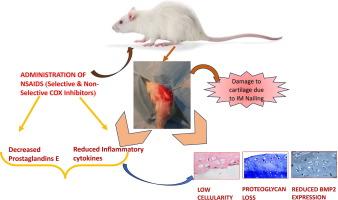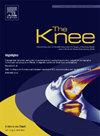Non-steroidal anti-inflammatory drugs influence cartilage healing
IF 1.6
4区 医学
Q3 ORTHOPEDICS
引用次数: 0
Abstract
Background
Retrograde intramedullary nailing is commonly performed to stabilize distal femoral shaft fractures which may lead to iatrogenic injuries of the knee articular cartilage. The limited regenerative capability of cartilage may further be hindered by intake of non-steroidal anti-inflammatory drugs (NSAIDs) which are usually advised for injuries of the musculoskeletal system. The current study was designed to evaluate the histological changes in the femoral articular cartilage of knee joint after retrograde femoral nailing of rats.
Methods
Retrograde intramedullary nailing was performed in 36 adult male Wistar rats, divided into three groups of 12 each. Groups 1 and 2 were given nonselective and selective COX 2 inhibitors, respectively, while the third group was taken as control. Half of the animals from each group were sacrificed at the second week, and remainder on the seventh week, and samples of the femoral articular cartilage were assessed for cartilage regeneration according to the modified Mankin scoring on histology while BMP-2 expression was evaluated on immunohistochemistry.
Results
Mean modified Mankin scores for cartilage degradation were increased in animals taking NSAIDs at the second and seventh weeks of healing (P = 0.02, P < 0.001 respectively). There was a significant decrease in chondrocytes at the second week (P = 0.001), along with the loss of proteoglycan content in these animals at both time points (P = 0.001). The BMP-2 expression was significantly enhanced in the control group at the second (P = 0.001) and seventh weeks (P = 0.001).
Conclusion
The results reveal that intake of NSAIDs hinders the process of cartilage healing by reducing the number of chondrocytes and loss of proteoglycan content and decreased expression of BMP-2.

非甾体抗炎药会影响软骨愈合。
背景:逆行髓内钉是稳定股骨远端骨折的常用方法,可能会导致膝关节软骨的先天性损伤。软骨的再生能力有限,摄入非甾体抗炎药(NSAIDs)可能会进一步阻碍软骨的再生,而非甾体抗炎药通常是治疗肌肉骨骼系统损伤的首选药物。本研究旨在评估大鼠股骨逆行钉入后膝关节股骨关节软骨的组织学变化:方法:36 只成年雄性 Wistar 大鼠分为三组,每组 12 只。第一组和第二组分别给予非选择性和选择性 COX 2 抑制剂,第三组为对照组。每组一半动物在第二周处死,其余动物在第七周处死,并根据组织学改良 Mankin 评分法评估股关节软骨样本的软骨再生情况,同时用免疫组化法评估 BMP-2 的表达:结果表明,服用非甾体抗炎药会减少软骨细胞的数量和蛋白多糖的含量,并降低 BMP-2 的表达,从而阻碍软骨愈合的过程。
本文章由计算机程序翻译,如有差异,请以英文原文为准。
求助全文
约1分钟内获得全文
求助全文
来源期刊

Knee
医学-外科
CiteScore
3.80
自引率
5.30%
发文量
171
审稿时长
6 months
期刊介绍:
The Knee is an international journal publishing studies on the clinical treatment and fundamental biomechanical characteristics of this joint. The aim of the journal is to provide a vehicle relevant to surgeons, biomedical engineers, imaging specialists, materials scientists, rehabilitation personnel and all those with an interest in the knee.
The topics covered include, but are not limited to:
• Anatomy, physiology, morphology and biochemistry;
• Biomechanical studies;
• Advances in the development of prosthetic, orthotic and augmentation devices;
• Imaging and diagnostic techniques;
• Pathology;
• Trauma;
• Surgery;
• Rehabilitation.
 求助内容:
求助内容: 应助结果提醒方式:
应助结果提醒方式:


